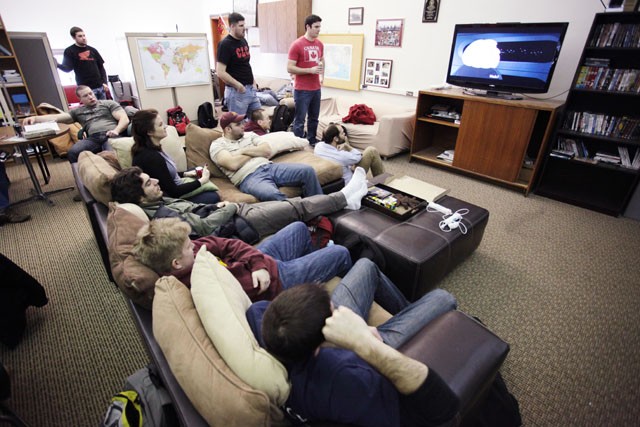If Kimberly Wooster had it her way, there would be no Facebook or texting in class.
âÄúIn the military, we have a different way of handling that type of disrespect,âÄù the University of Minnesota senior said. âÄúBack then, someone wouldâÄôve taken the phone, thrown it on the ground and smashed it.âÄù
She said, however, she feels fortunate to have found a place where she can talk about her frustrations.
The UniversityâÄôs Veterans Transition Center is focused on addressing this transition for student veterans: from military to college life.
Wooster, a 32-year-old mother and wife, spent eight years working on nuclear reactors in the U.S. Navy. SheâÄôs the president of the Student Veterans Association, a group devoted to meeting the needs of students whom she said are nontraditional in more than one way.
âÄúItâÄôs not just that weâÄôre older, and itâÄôs not just that we served,âÄù she said. âÄúEvery part of our life is not traditional for college, but we still want to be part of the student community.âÄù
The Veterans Transition Center, located in Room 302 in Wesbrook Hall, has opened doors for that student community.
The space houses large couches, a television, DVDs, computers, free printing, private study space and a refrigerator always stocked with soda.
Every Friday, the room transforms into a place for relaxation during Free Pizza Fridays, where pizza, beverages, movie viewing, games and conversation take place for the 40 to 60 people who stop by weekly, Wooster said.
The transition center is effective because it addresses the loneliness that comes with having a life experience so different from that of a majority of students on campus, said Mathew Ryden, who served in the U.S. Marine Corps for six years.
âÄúI came back to school sitting in classes with 18-year-olds when I was 26,âÄù the electrical engineering student said. âÄúI needed somebody. I looked for a place where people older than other students can go and be involved, and this had enough familiarity to make me feel at home.âÄù
Most agree the tight-knit nature of the group is very familiar to the military life many of them left behind.
âÄúIn the service you literally live, work and share quarters with the same people,âÄù Erin Elizabeth Tague said over a game of Bananagrams during the most recent Free Pizza Friday. âÄúHere everybody just understands. WeâÄôre very tight knit but not exclusionary. Sometimes it feels like being back in [the service] in that way.âÄù
Both Tague and Wooster said there are times they feel misunderstood or stereotyped by their peers.
âÄúIâÄôm jealous of students who are able to do this traditionally,âÄù Wooster said. âÄúI love my husband and daughter, but I would love the opportunity to do it all over again.âÄù
Tague said she gets offended with the questions nonveterans ask: Did she have to cut all her hair off? Was she sexually harassed by men in the military?
The one question that seemed to irk every veteran in the room was whether they had ever killed in the line of duty.
âÄúWhy would you ask somebody that?âÄù Tague said.
Wooster agreed that there is often a divide between the assumptions of some students and the actual military way of life, citing assumptions that veterans are underachievers and had to join the service âÄúas a last resort.âÄù
Wooster said she received nuclear engineering training on par with that of Harvard University and the Massachusetts Institute of Technology in the Navy and acts as an example of this academic commitment by using study strategies instilled through her training âÄî like the 1,800 note cards she uses to study.
The group offers frequent recreational opportunities to its nearly 400 members, including an annual skiing trip during winter break, a summer camping trip, dinner outings, sporting events and community outreach.
Many students find out about the center during their mandatory student veterans orientation, but Wooster said she hopes all students feel welcome to the center.
One student, Michelle Keenan, said that though she had never served in the military, the center presented her with the opportunity to feel more connected with her sonâÄôs father, who is currently deployed in Iraq.
In the end, the center has been pivotal to the studentsâÄô ability to adapt to campus life.
âÄúThis is more than just a community or a subculture,âÄù Tague said as she finished up her Bananagrams game Friday. âÄúItâÄôs like a family.âÄù

Image by Erin Westover
Students of the MN veterans group watch a movie Friday afternoon in Westbrook Hall. The group has pizza friday every week where members can come and relax for a few hours before continuing with homework.
Student vets find campus family
U center offers student veterans a smooth transition into college life.
Published February 8, 2011
0

